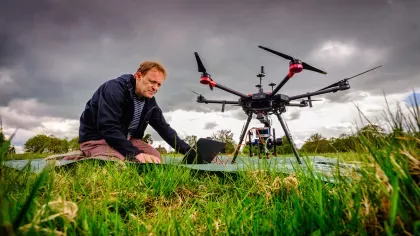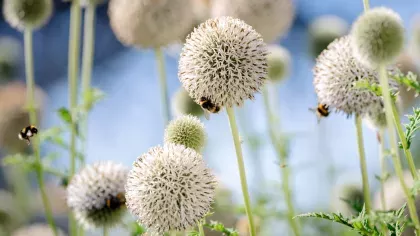11 February 2025
4 min read
The Women behind Nature Unlocked
Meet the women working on Wakehurst's landscape ecology programme this International Day of Women and Girls in Science.

International Day of Women and Girls in Science is an opportunity to shine the spotlight on women working in STEM (Science, Technology, Engineering and Maths) roles. Discover the stories of some of the women behind Nature Unlocked, turning Wakehurst's diverse landscapes into a living laboratory.
Libby Howell, Nature Unlocked Programme Officer
Previously an environmental educator, Libby developed a passion for how knowledge sharing can support nature conservation. She especially enjoyed fostering the connection between young people and nature. Libby now works with the scientists, making sure they have what they need to unlock the benefits of biodiversity, along with supporting their fieldwork. She also welcomes visitors to the living laboratory, bringing to life Wakehurst's multi-habitat landscape and its diverse range of science projects.
I am privileged to work in a beautiful and diverse landscape like Wakehurst and am able to visibly see the science develop in real-time. The knowledge of the people here is inspirational, and their lived experiences motivate me to contribute to the work that we do and love it. It is a microcosm of unique and like-minded people, all linked through their shared respect of nature, affinity with the landscapes and their personal experiences of nature connectedness.

Eliana van der Schraft, Citizen Science Lead
Eliana leads the citizen science projects within Nature Unlocked, engaging communities with Wakehurst's science and horticulture. She does this by coordinating Trees for Bees with pollination scientist Dr Janine Griffiths-Lee. This project aims to find out which trees our native pollinators like best so we can make our cities more friendly for them. She helps visitors to become citizen scientists by watching and counting pollinators on trees around the gardens, and supporting our conservation efforts. This work provides Janine with vital data.
It is a privilege to introduce new people to Wakehurst and allow them to contribute to the science we are doing here, as it can often feel out of reach for people. Science is typically associated with lab coats and advanced degrees, and while this is sometimes true, really it is about curiosity. Living in the world and being curious about ‘the what’ and ‘the how’ that surrounds you, and helping others make that connection is incredibly fulfilling.

Miranda Bolton, Pollination Research Assistant
Miranda works with Dr Janine Griffiths-Lee’s team to understand pollinator populations and their preferences across Wakehurst's landscapes. She uses the gardens as a living laboratory, inventorying the wild bees and moths that forage and nest there. By running DNA and chemical analyses, she can find out about these pollinators' preferences, then study how they influence their growth and development. The results can help with planting and nest-building approaches. This is especially valuable in urban and agricultural environments, which have been affected by climate change and shifts in land-use.
As an early career scientist and bug-lover, it's an incredible privilege to have the opportunity to collect baseline data on insects, further establishing Wakehurst as a site of important scientific research. In the field, I’m experiencing first-hand the increasing public awareness behind the importance of pollinators, engaging with visitors about our science and how anyone can get involved. I love the quirks and intricacies of insects more and more each day, and I hope to encourage others to feel the same!

Julie Whelan, Nature Connectedness Research Lead
Julie leads on the Nature Connectedness strand of Nature Unlocked. ‘Nature connectedness’ describes an individual’s relationship with nature, and the benefits felt from noticing and appreciating it. She co-designs the research programme and increases public awareness of its benefits. In a nutshell, she adds the ‘people layer’ to Nature Unlocked.
Excitingly for me as an educator, nature connectedness has also been shown to have positive impacts on our health and wellbeing. We’ve made wellbeing walks central to Wakehurst’s schools offer, encouraging pupils to stop, look and listen and really tune in to their senses. We now want to know how to create spaces that foster nature connection and have the maximum impact in terms of wellbeing and a desire to protect the natural world.

Dr. Jill Kowal, Research Associate
Nature Unlocked has allowed regular collaboration across Kew Science for the last three years. Jill has worked as part of Nature Returns, a carbon research programme. Jill's 'soil squad' tests ideas and builds methods to measure plant-fungal interactions. The team focuses on mycorrhizas (fungus roots), which are the 'engine' providing food to their plant hosts aboveground. In exchange, the plant hosts provide carbon to these fungi.
At Wakehurst we set up a pop-up lab and slept ‘on campus’ for nearly two months (spread over the seven seasonal visits). Seeing the turning of seasons unfold and the beauty and diversity within was a particular treat, and getting to know our Wakehurst colleagues was invaluable in understanding each others' questions while building a unified picture; the sum of the parts became greater than the whole.

Discover more about Nature Unlocked, and how our scientists are researching the benefits of biodiversity for people and plants.


